|
BOOK NOW |
ASK ABOUT YOUR PAIN |
Home > Blog > Physiotherapy > Conditions > Shoulder Pain Physiotherapy > Burning Shoulder Pain Physiotherapy
Burning Shoulder Pain Physiotherapy

Burning shoulder pain can be mildly to very uncomfortable, and can be even downright unpleasant.
It may come and go, or persist there consistently. Sometimes, it may affect just a very specific area in the shoulder, or it may affect a larger area. Sometimes, the burning shoulder pain may "travel" (ie radiate) downwards into the arm or it may travel upwards to the back or neck.
And most patients report that it bothers and disrupts their sleep.
Like the symptoms, burning shoulder pain can have variable causes as well. It can be caused by
- a problem in the shoulder joint
- a problem in the tissues surrounding the shoulder
In most cases, burning shoulder pain is typically related to a neck-related problem EVEN IF there are no neck symptoms (yeah, sometimes it seems unrelated but explore more in the article below)
In this article, we will explore at the most common causes of burning pain in the shoulder and the common symptoms of each and every one of the conditions as well as the typical age groups affected.
This will help you identify which one is most likely to be the cause including how to tell whether you have a shoulder problem or if you actually have a neck issue that's causing your shoulder pain.
Neck Versus Shoulder Problems
So how can you tell if your burning shoulder pain is due to a shoulder problem or a neck problem?
Here is a simple guide to help:
|
Neck Problem
|
Shoulder Problem
|
As most typical cases of burning pain in the shoulder tends to be caused by neck issues, let's start by exploring neck or neck-related issues, and then only go on to look at possible shoulder problems or other medical conditions that can bring on or aggravate burning shoulder pain.
Neck and / or Nerve-related issues
Often, burning pain in the shoulder is actually caused by a problem in the neck or surrounding nerves.
Even if patients hadn’t noticed any pain or stiffness in the neck itself, it may be what is called “referred or radiating pain”, meaning that the pain is felt in a different location compared to the real source of the problem.
(This often happens in trigger points.)
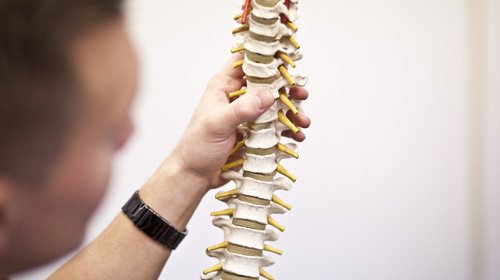
So our human neck is comprised of seven bones (our spine bones is called vertebra bones, or vertebral bones), which "sit" on top of each other like a curved pillar - imagine a totem or a stack of cotton reels.
And located between each vertebral bones are cushion-like and flexible ring shaped structures known as spinal or intervertebral discs (ie disc between the vertebral bones), which in turn is comprised of
- a thick outer layer of cartilage (annulus) and
- inner gel-like material (nucleus)
And then starting at the top of our neck, just below the bottom of the brain, and all the way down the back of the spine, there is a long continuous spinal canal (medically termed as the spinal cord).
You can visualize our brain as the main computer, and the spinal cord as the major connecting cables that travel from the mainframe (brain) all the way down to our tail bone.
At every spinal level, there will be a pair of nerves (medically termed as nerve roots) that divide off the spinal cord and branch as long long nerve cable which extend down the arms and legs (minor cables offshooting from the major central connecting cables).
Our brain sends instructions up and down these nerve cables (medically termed as the peripheral nervous system) in form of electrical impulses, and the central nervous system sends out instructions to the peripheral nervous system to control movement eg where to go, in which direction, in which plane/angle and what muscles to activate not activate etc.
It also takes in an interprets inbound/incoming sensory signals from the peripheral nervous system eg
- hot
- cold
- sharp
- vibration
- etc
If any part of the nerve is compressed, compromised or irritated, for whatever reason, it can lead to abnormal sensations anywhere along the path of the nerve.
One of the common symptom of nerve irritation is burning shoulder pain, but there may also be
- tingling
- pins and needles
- no sensation
- numbness
- weakness
These abnormal sensations may be felt anywhere along the path of the nerve, known as referred pain or radiculopathy.
Burning shoulder pain is typically due to nerve irritation from one of the following:
1) Disc Disease
Pressure on the nerve root due to problems in the disc is a common cause of burning pain in the shoulder.
It can be caused by:
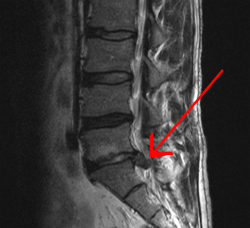
1) Disc Bulge
When the central gel-like portion of the disc (the nucleus) protrudes out placing pressure on the nerve root
A tear develops in the discs outer layer (the annulus) allowing the inner jam-like nucleus to leak out, collecting around and irritating the nerve root – imagine pressing and squeezing a jam donut until the jam bursts outwards.
This is commonly, and unhelpfully, referred to as a “slipped disc” - do note that the spinal disc itself does not pop or slip out, it is always stable in the same place, it is only the nucleus that leaks out
As we grow older, our spinal discs dehydrate and shrink, becoming
- less plump
- less flexible
- less strength (weaken)
It doesn't work as well as before and now provides
- less space between the vertebrae
- less cushioning
- doesn’t adapt as well to movement (less flexible)
- and it is more likely to get damaged,
...any of which can lead to pressure on the nerve root unfortunately.
Burning shoulder pain that is due to disc disease in the neck usually:
- Affects one arm (occasionally it may affect both arms), spreading further down the arm over time
- Worsens when you cough or sneeze as those movements increase the pressure in the discs
- Worsens with certain neck movements as the disc gets squashed
- Is accompanied by other symptoms such as pain, tingling/pins and needles, an “ant-like crawling" sensation or even numbness
- Is worse first thing in the morning as discs “plump up” slightly overnight (due to less pressure on the discs when you lie down), increasing the size of the bulge
- Is not affected by arm movements i.e. moving the arm doesn’t bring on the pain unless the movement places the nerve under tension
- Comes on gradually (disc degeneration or disc bulge) or suddenly (disc bulge or herniation) from an injury such as heavy lifting
- May or may not be accompanied by neck pain
- Disc bulge/herniation usually affects people aged 30-50, disc degeneration typically affects those over 60
Spinal stenosis is another possible cause of burning shoulder pain.
Spinal stenosis refers to abnormal narrowing of the spinal canal (the gap in the spine for the spinal cord) which places increased pressure on the spinal cord and nerve roots.
Related articles:
- cervical stenosis
- lumbar stenosis
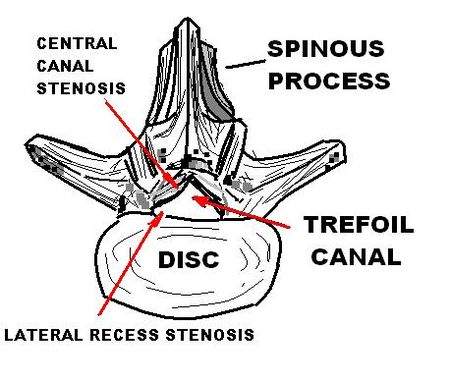
Symptoms usually start to appear when the spinal canal space has decreased by around 30%.
Decrease space at the side of the canal affects the nerve root, but if it's moreso central narrowing, that instead affects the spinal cord. Burning shoulder pain due to spinal stenosis usually:
- Starts gradually rather than suddenly
- May refer down the arms and legs
- Affects both arms
- Worsens when flexing the neck (looking down) or standing
- Affects hand function making activities such as writing or cutting food difficult
- May be accompanied by weakness, pins and needles, numbness, pain and heaviness in the arms
- In severe cases may affect bladder and bowel function, cause balance problems or paralysis
- Affects those over the age of 50
Warning: Cervical stenosis can be extremely serious if there is too much narrowing of the spinal canal and the spinal cord is affected. In severe cases, surgery may be needed.
3) Brachial Neuritis
Brachial neuritis causes both motor weakness and sensory issues. Patients often report experiening a sharp, burning pain in the shoulder, shoulder blade, arm and hand.
Brachial neuritis is caused by inflammation of the brachial plexus, which is a bundle collection of nerves that travel from the lower neck, across the front of the chest, to the arm pit.
It can be caused by
- a hereditary condition (from a gene mutation),
- a problem in the immune system e.g. following an illness, surgery or immunisation
Burning shoulder pain from brachial neuritis typically:
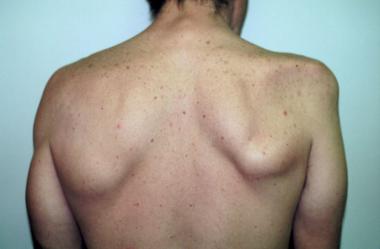
- Comes on suddenly, usually at night, with immediate severe, sharp, stabbing, burning pain in shoulder
- Is constant – never settles
- May spread down the arm as far as the hand
- Usually only affects one arm
- Gets worse with arm movements
- Is worse at night time
- Arm weakness may develop after a few weeks making it hard to move the arm
- May be accompanied by tingling or numbness in the arm or occasionally shortness of breath
- Affects more men than women
- Most common in young/middle aged adults, can affect children
Treatment usually involves a combination of strong painkillers, physical therapy and exercises.
4) Neck Arthritis Aka Cervical Spondylosis
Cervical (neck) arthritis is another possible cause of burning pain in the shoulder which is caused and aggravated by common wear and tear of the neck bones and discs.
What happens is then our spinal (intervertebral) discs start to dry and shrink, become weaker and lose height, and the smooth surface on the bones gradually wears away and bone spurs form, narrowing the space around the vertebrae which can place pressure on the surrounding nerves.
Neck arthritis is extremely common affecting around 80% of people over the age of 60, but fortunately many of those don’t experience any noticeable symptoms.
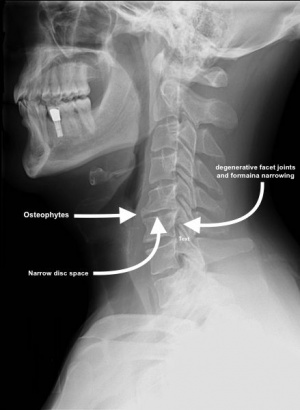
Cervical spondylosis typically presents with the following picture:
- Neck pain that radiates to the shoulder and/or shoulder blades often described as a nagging ache or toothache type pain. If there is pressure on the surrounding nerves there may also be burning shoulder pain
- Neck stiffness e.g. may not be able to turn your head as far to one side
- Symptoms usually worse in the morning, ease with initial movement, but may then get worse towards the end of the day
- Symptoms ease with rest
- Aggravated by neck movements
- Grinding noise with neck movement
- May be accompanied by headaches
- Most common over the age of 60
Most cases of cervical spondylosis respond well to medication and physical therapy.
Shoulder Problems Causing Burning Pain in shoulder
Whilst most cases of burning shoulder pain come from the neck, it may also be a problem in the shoulder itself.
The two most common shoulder problems that cause burning pain in the shoulder are shoulder bursitis and shoulder tendonitis:
1) Shoulder Bursitis
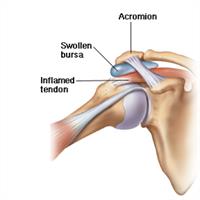
Burning pain in the shoulder that is fairly localized may be caused by bursitis.
Bursa are small fluid-filled sacs that sit between soft tissues (such as muscles and tendons) and bones, allowing smooth, friction-free movement. Irritation on and of the bursa from
- excessive/repetitive pressure
- excessive/repetitive injury
- traumatic injury such as a fall
- excessive/repetitive friction
can lead to inflammation which can cause burning shoulder pain. There are a number of different bursae located around the shoulder and shoulder blade which may be affected.
Burning shoulder pain from bursitis tends to:
- Be a low level aching and burning pain in shoulder which gets progressively worse
- Develop gradually over time unless there was a specific injury
- Be fairly localized (i.e. over a specific spot) – may start to spread as the condition worsens but will not refer pain below the elbow
- Get worse with arm movements particularly when the arm is raised above shoulder height
- Get worse when there is pressure on the bursa e.g. lying on your side
- Affect sleep causing frequent waking
- Lead to weakness and stiffness in the arm over time
- Take several weeks/months to settle
- Can occur at any age
Burning shoulder pain from bursitis usually responds well to rest, physical therapy, exercises, injections and anti-inflammatory pain medication.
2) Shoulder Tendonitis
Another cause of burning shoulder pain is tendonitis when there is degeneration and or inflammation in one of the muscle tendons, such as the rotator cuff or biceps tendon.
Related Article:
This is typically caused and aggravated by
- repetitive friction on the tendon (usually from repetitive activities such as throwing, racket sports or manual labor)
- excessive pressure from the surrounding structures (e.g. bone spurs)
- muscle weakness
- poor posture
Symptoms of shoulder tendonitis usually include the following:
- Diffuse aching/burning shoulder and upper arm pain with a localised sharp pain when moving the arm. Does not refer symptoms below the elbow
- Worse when raising the arm above shoulder height or when moving the arm against resistance (try moving your affected arm out to the side while stopping the movement with your other hand – if there is pain, it may well be tendonitis)
- Develops gradually over time due to repetitive wear and tear and gets progressively worse
- There may be accompanying crepitus with arm movements (grating, clicking, grinding noises)
- Tender to touch over the affected tendon – location will vary depending on which tendon is affected
- Can occur at any age
Burning pain in the shoulder usually responds well to rest, physical therapy and strengthening exercises.
Other Causes Of Burning Shoulder Pain
There are a few other conditions that can cause burning shoulder pain:
1) Fibromyalgia
A condition where a chemical imbalance in the brain and problems in the way the central nervous system processes pain signals lead to widespread
- aching
- burning pain
- hypersensitivity
- stiffness
- fatigue
Fibromyalgia commonly affects people between the ages of 30-50.
Burning shoulder pain from fibromyalgia will usually be accompanied by pain in a number of other joints as well as shown on the diagram here.
2) Restless Arm Syndrome
A condition where there is a problem in the central nervous system which causes abnormal movements (e.g. spontaneous jerking movements) and strange sensations such as
- crawling
- tingling
- burning shoulder pain
Usually affects both arms and may also affect the legs.
3) Gall Bladder Problems
The gall bladder is a small sac that stores bile from the liver.
Problems in the gall bladder such as inflammation or gallstones can cause burning pain in shoulder. Symptoms include intense abdominal pain which may refer to the shoulder, particularly around the
- right shoulder blade
- chest pain
- nausea
- heart burn
- and often feeling worse after eating
4) Shingles
If your burning shoulder pain is accompanied by a rash, it may be that you have shingles. The pain may be quite intense. Only one side of the body will be affected.
5) Heart Attack
Burning shoulder pain accompanied by chest pain (usually a tight, crushing pain), shortness of breath, dizziness, nausea and sweating may indicate a heart attack. A heart attack is a medical emergency – seek medical assistance immediately.
6) Sleeping Awkwardly
Burning shoulder pain that starts when you wake up may be due to having slept awkwardly.
One of the shoulder muscles or nerves in the neck may have been irritated causing burning pain in shoulder. The pain will usually settle down after a few hours/days – gentle stretching exercises can help.
7) Muscle Fatigue
Delayed onset muscle soreness (DOMS) can cause burning pain in the shoulder. If you have suddenly increased you activity level or taken up a new sport, this may be the problem.
References